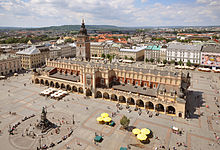Marketplace (urban development)

As marketplace has applied since the Middle Ages, a place within a city or a village , are traded on the tangible or intangible goods and based on the respective municipal or local law. The marketplace was usually also the stacking place .
Mercantile benefit

This type of trade , which was made possible by the granting of market rights , had made a major contribution to the prosperity of the cities in the Middle Ages. Since the beginning of urban development, markets have been the centers of urban life, often including urban areas of high architectural rank. Even today, the market square is usually the central square in a city where the town hall was built.
In larger cities, there were often several marketplaces that used to offer specific goods. There was also a fruit / green, milk and meat market , some of whose names are still used today as street names, as well as special markets such as horse and cattle markets , which were usually held in the suburbs .
Legal benefit
Since justice should be pronounced in a free and uncovered place, tables, benches and fences were specially set up for the negotiations . When the jurisprudence withdrew into its own, initially open court buildings and houses, these were built on the market or allowed full insight into the people through wide windows. The place of execution was the market square with executions, public exhibitions, stabbing and the use of pillory .
Street names

Typical names of the squares or today's street names that go back to markets are:
- Market, marketplace
- Main market; Special markets: Horse market, Rossmarkt (horses), Schrannenplatz (especially grain), Viktualienmarkt ( Viktualien , groceries), Naschmarkt, Gänsemarkt, fish market, grain market, hay market, wool market
- Old market, new market